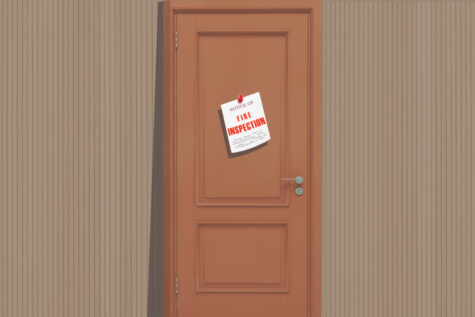OPINION | What’s behind that fire safety email? More than you think.
October 26, 2022

On Tuesday, Oct. 18, in the week leading up to Wave Weekend, Tulane University students received a daunting and unexpected email. The subject line of the email uses several alarming buzzwords — Fire Safety Enforcement — quite an effective scare tactic indeed.
The email was sent from the dean of students, Erica Woodley, and begins, “Recently, we began working with the Louisiana State Fire Marshal and Louisiana State Rep. Aimee Freeman regarding fire safety issues in residential rental properties surrounding Tulane University.”
In its first word, the email points out the fact that fire safety enforcement is a recent effort that the university has adopted. However, an interesting thing to note is that Tulane releases an Annual Fire Safety and Security Report. So, how is this fire safety enforcement email different or related?
This fire safety enforcement email seems to pertain specifically to the safety conditions of off-campus residents, whereas the Annual Fire Safety and Security Report provides a more general overview of evacuation procedures.
The email informs students that the university, in collaboration with the fire department, would begin conducting inspections of off-campus houses following reports that many of these homes are not meeting the correct fire safety criteria.
These reports come from numerous residents in the neighborhoods surrounding Tulane’s campus. Many of these same residents are proponents of Stop Doubles-to-Dorms — a movement against out-of-state developers converting local single or double-family homes in order to house more off-campus students.
Supporters of the movement claim that Doubles-to-Dorms, otherwise known as D2D, has resulted in a decreased quality of life, as well as high market rates for homes.
The D2D movement seems to stall often, despite having persisted for almost two years. Developers have no incentive — other than appeasing their community members — to stop converting local homes for profit.
As a result, the movement seems to have adopted an alternative tactic. Louisiana State Rep. Aimee Freeman spoke to Louisiana State Fire Marshal, Daniel Wallis, on behalf of unhappy residents and members of the D2D movement. This conversation prompted a spur of complaints from locals to be sent to the State Fire Marshal claiming that many off-campus student homes were violating the state’s fire safety measures.
Rep. Freeman, with the support of the State Fire Marshal — on behalf of the D2D proponents — seems to have come to the university for next steps.
Ensuring fire-safe conditions for student living is certainly an admirable venture; however, the time between when the email was sent and timing of the inspections did not necessarily give students enough time to address the demands. This is particularly problematic considering the email gives the State Fire Marshal the authority to evict students.
However, the Department of the Fire Marshal has clarified that these notices are not intended to be threatening toward students. Rather, the notices remind and encourage communication between residents and their landlords.
There is not necessarily any particular blame to be placed. Nonetheless, the situation may not have been handled entirely appropriately. Student living situations should not be a pawn in advancing the political agenda of the city or the university.
Certainly, there is validity and merit to the claims of members of the D2D movement, and they advocate for an admirable cause. However, using house fire safety precautions to conceal neighborhood politics is hardly noble. Ultimately, it is not the intention of students to decrease the quality of life for their neighbor, nor are locals trying to scare or evict students, but maybe this is an opportunity to build a community between the university and the neighborhood.
Perhaps, the combined efforts of the State Fire Marshal, Rep. Freeman, D2D supporters and Tulane had a net positive result; perhaps some off-campus houses are better protected from fire hazards. Yet, were the methods necessarily appropriate?








Leave a Comment